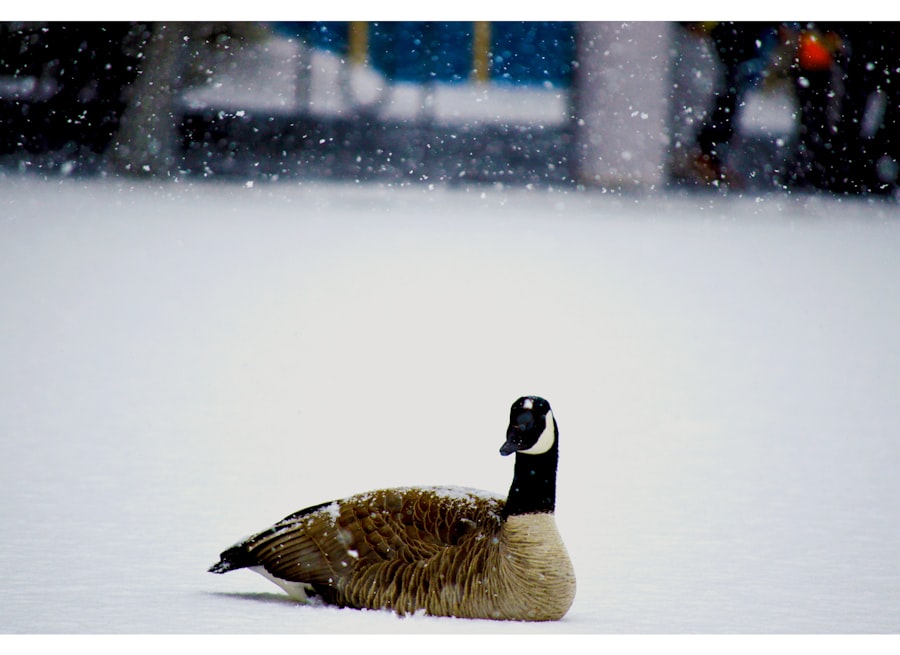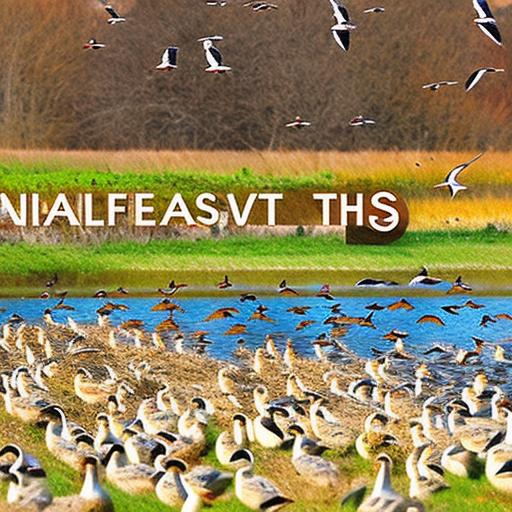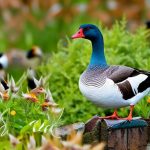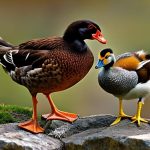Geese are large waterfowl that are known for their distinctive honking sound and V-shaped flying formation. They are found in various parts of the world and are known for their adaptability to different environments. Geese are social animals that live in flocks and are highly territorial. They have a strong sense of community and will defend their territory aggressively.
Understanding geese behavior is crucial when it comes to keeping them away. Geese can become a nuisance when they invade private property, parks, golf courses, and other areas where they are not welcome. They can cause damage to property, leave behind droppings that can be unsightly and unsanitary, and even pose a threat to human safety, especially during nesting season.
Key Takeaways
- Geese can be a nuisance due to their droppings, aggressive behavior, and noise.
- Natural methods to keep geese away include planting certain types of vegetation and using decoys.
- Landscaping can also be used to deter geese by creating barriers and reducing open spaces.
- Physical barriers such as fences and netting can prevent geese from entering certain areas.
- Sound and light devices, as well as trained dogs, can be effective in scaring geese away.
Why Geese Can Be a Nuisance
Geese can cause a variety of problems when they become a nuisance. One of the main issues is the damage they can cause to property. Geese have a voracious appetite and will graze on grass, crops, and other vegetation. This can lead to significant damage to lawns, gardens, and agricultural fields.
Another problem with geese is their droppings. Geese produce a large amount of waste, and their droppings can be unsightly and difficult to clean up. They can also pose health risks as they can contain bacteria such as E. coli and Salmonella.
Geese can also be aggressive towards humans, especially during nesting season when they are protecting their eggs or young goslings. They may hiss, flap their wings, or even charge at people who come too close to their nesting area. This can be intimidating and potentially dangerous.
Natural Methods to Keep Geese Away
There are several natural ways to deter geese from invading your property. One effective method is to use plants that geese find unappealing. Geese prefer open areas with short grass, so planting tall grasses or shrubs can make your property less attractive to them. Additionally, planting prickly or thorny plants can deter geese from landing and grazing.
Another natural method is to use reflective objects such as mirrors or shiny tape. Geese are wary of unfamiliar objects and may be deterred by the reflection and movement of these objects. Placing them strategically around your property can help keep geese away.
Using Landscaping to Deter Geese
Landscaping techniques can also be used to keep geese away. One effective method is to create barriers using rocks or gravel. Geese prefer open areas with easy access to water, so creating a barrier of rocks or gravel around ponds or lakes can discourage them from landing and grazing.
Another landscaping technique is to create a natural buffer zone between your property and the water source. This can be done by planting tall grasses, shrubs, or trees along the shoreline. This creates an obstacle for geese and makes it more difficult for them to access your property.
Installing Physical Barriers to Prevent Geese from Entering
Physical barriers can be an effective way to prevent geese from entering your property. One common barrier is a fence. A fence should be at least three feet high and have small gaps or mesh to prevent geese from squeezing through. It is important to ensure that the fence is secure and does not have any gaps or openings that geese can exploit.
Another physical barrier option is a netting system. Netting can be installed over ponds, gardens, or other areas where geese are likely to cause damage. The netting should be securely fastened and have small enough holes to prevent geese from getting through.
Using Sound and Light to Scare Geese Away

Sound and light can be effective deterrents for geese. Geese are sensitive to loud noises and sudden movements, so using devices that emit loud sounds or flashing lights can scare them away. This can include using air horns, motion-activated sprinklers, or even playing recordings of predator calls.
Another option is to use laser devices that emit a bright, flashing light. Geese are sensitive to light and may be deterred by the sudden flashes. These devices can be set up strategically around your property to create a deterrent effect.
Repelling Geese with Chemicals and Scents
Chemical and scent-based repellents can also be used to keep geese away. There are commercially available products that can be sprayed on lawns, gardens, or other areas where geese are causing problems. These products typically contain ingredients that geese find unpleasant or irritating, such as grape extract or methyl anthranilate.
It is important to follow the instructions on these products carefully and use them in accordance with local regulations. Some repellents may need to be reapplied regularly, especially after rain or irrigation.
Training Dogs to Chase Away Geese
Dogs can be trained to chase away geese and keep them off your property. Certain breeds, such as Border Collies or Labrador Retrievers, are particularly well-suited for this task due to their herding instincts and high energy levels.
Training a dog to chase away geese involves teaching them basic obedience commands and then introducing them to geese in a controlled environment. The dog should be trained to respond to commands such as “leave it” or “go away” when directed towards the geese. It is important to ensure that the dog does not harm the geese but rather acts as a deterrent.
Building Nesting Platforms to Encourage Geese to Nest Elsewhere
Building nesting platforms can be an effective way to encourage geese to nest in a different location. Geese prefer nesting near water sources, so building nesting platforms away from your property can help redirect them.
Nesting platforms can be constructed using materials such as wood or PVC pipes. They should be placed in areas that are less desirable for geese, such as open fields or marshy areas. It is important to regularly monitor the platforms and remove any eggs or nests to prevent geese from becoming established in the area.
Conclusion and Final Thoughts on Keeping Geese Away
In conclusion, geese can be a nuisance when they invade private property or public spaces. Understanding their behavior and implementing effective deterrent methods is crucial to keep them away. Natural methods such as planting unappealing vegetation or using reflective objects can be effective. Landscaping techniques, physical barriers, sound and light devices, chemical repellents, trained dogs, and nesting platforms are all viable options for keeping geese away. It is important to be proactive in deterring geese to prevent damage, unsightly droppings, and potential safety risks.
If you’re looking for effective ways to keep geese away, you might also be interested in learning about the benefits of keeping chickens for a family of four. Poultry Wizard offers a helpful article on how many chickens you need for a family of four, providing insights into the ideal number of chickens to meet your family’s egg and meat needs. Understanding the dynamics of chicken keeping can not only enhance your self-sufficiency but also potentially deter geese from invading your property. Check out the article here to discover more about this fascinating topic.
FAQs
What are some natural ways to keep geese away?
Some natural ways to keep geese away include using decoys, planting certain types of vegetation, and using noise deterrents.
What are some man-made ways to keep geese away?
Man-made ways to keep geese away include using physical barriers, such as fences or netting, and using chemical repellents.
What types of vegetation can be planted to keep geese away?
Vegetation that can be planted to keep geese away includes tall grasses, shrubs, and trees that provide cover and make it difficult for geese to land and take off.
What are some noise deterrents that can be used to keep geese away?
Noise deterrents that can be used to keep geese away include propane cannons, air horns, and electronic devices that emit distress calls or predator sounds.
Are there any humane ways to keep geese away?
Yes, there are humane ways to keep geese away, such as using visual deterrents like reflective tape or balloons, or using motion-activated sprinklers that startle geese without harming them.
Why is it important to keep geese away?
It is important to keep geese away because they can cause damage to property, create unsanitary conditions, and pose a safety risk to humans, particularly in areas where they may come into contact with aircraft.
Meet Walter, the feathered-friend fanatic of Florida! Nestled in the sunshine state, Walter struts through life with his feathered companions, clucking his way to happiness. With a coop that’s fancier than a five-star hotel, he’s the Don Juan of the chicken world. When he’s not teaching his hens to do the cha-cha, you’ll find him in a heated debate with his prized rooster, Sir Clucks-a-Lot. Walter’s poultry passion is no yolk; he’s the sunny-side-up guy you never knew you needed in your flock of friends!







